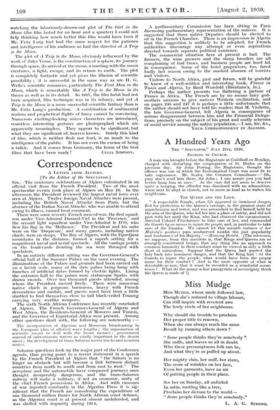Correspondence
A LETTER FROM ALGIERS.
[To the Editor of the SrEcrieroli.]
Sin,—The centenary celebrations at Algiers culminated in an official visit from the French President. Two of the most spectacular events took place at Algiers on May 10. In the afternoon the President reviewed the largest naval force ever seen at Algiers. Twelve foreign Naval Attaches were present, including the British Naval Attaché from Paris, but the absence of the Italian Naval Attaché, who was unable to attend owing to illness, caused local comment. There were sonic seventy French men-of-war, the first squad- ron under Vice-Admiral Durand-Viol in the 'Provence,' and the second light squadron under Vice–Admiral le WO, who flew his flag in the 'Mulhouse.' The President and his suite were on the 'Duquesne,' and many guests, including native chiefs, were on sloops. The Bay of Algiers, with the Djurdjura mountains in the distance, formed a superb setting for a magnificent naval and aerial spectacle. All the vantage points on the boulevards fronting the sea were thronged with spectators. In an entirely different setting was the Governor-General's official ball at the Summer Palace on the same evening. The illuminations of the Palace and grounds had been carried out on a lavish scale, ninny of the date palms being hung with bunches of artificial dates formed by electric lights. Lining the entrance hall to the palace were statuesque Spahis with drawn swords. Over ten thousand guests attended, among whom the President moved freely. There were numerous native chiefs in gorgeous burnouses, heavy with French decorations and medals, and guests must have been a little startled to find themselves close to tall black-veiled Touareg carrying very warlike weapons. The sixth North African Conference has recently concluded at Algiers. The French Governors-General of Algeria and West Africa, the Residents-General of Morocco and Tunisia, and the Governor of Equatorial Africa were present. Among other questions dealt with, the following are noteworthy :—
The incorporation of Algerian and Moroccan broadcasting in the European plan of allotted wave lengths ; the organization of scientific means to deal with the locust menace : government control of subterranean waters so vitally important in the desert oases ; the development of trans Saharan motor tracks and aviation routes.
Saharan questions took up the major part of the Conference agenda, thus giving point to a recent statement in a speech by the French President at Algiers that " the Sahara is no longer an obstacle but will become a link between distant countries from north to south and from east to west." The aeroplane and the automobile have conquered journeys once thought insuperably dangerous, and the trans-Saharan railway will make a military, if not an economic, unity of the chief French possessions in Africa. And with rumours of war reported constantly in the Algerian Press it is sig- nificant that the French are considering the expenditure of one thousand million francs for North African coast defence, as the Algerian coast is at present almost undefended, and was shelled with impunity during 1914. A parliamentary Commission has been sitting in Paris discussing parliamentary representation of the natives. It is suggested that three native Deputies should be elected to sit in the French Chamber. There is an impression in Algeria that this suggestion is unlikely to be adopted, for French authorities discourage any attempt or even aspirations directed towards separate political existence. The commercial situation here at present is bad. The farmers, the wine growers and the sheep breeders are all complaining of bad times, and business people are hard hit in consequence. Some of the hotel proprietors, too, fared badly last season owing to the marked absence of tourists and visitors.
Visitors to North Africa, past and future, will be grateful to know of a well-written and interesting book, France in Tunis and Algeria, by Basil Worsfold (Brentano's, 5s.). Perhaps the author presents too flattering a picture of France in Africa. The French are by no means fairy god- mothers anxious to give natives Western civilization, and on pages 246 and 247 it is perhaps a little unfortunate that the author should not have told his readers that M. Viollette, the late Governor-General, left Algeria in consequence of serious disagreement between him and the Financial Delega- tions, precisely on the subject of his great and costly schemes of social service among the native population.—I am, Sir, &c.,
YOUR CORRESPONDENT IN ALGIERS.
































 Previous page
Previous page